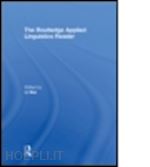Part I: Reconceptualising the native speaker and the language 1. The native speaker in applied linguistics. Alan Davies. 2. The idealised native speaker, reified ethnicities and classroom realities. C. Leung, R. Harris and B. Rampton. 3. "Ownership" of English in the Outer Circle: An Alternative to the NS-NNS Dichotomy. Christina Higgins. 4. Non-native speaker teachers and English as an International Language. Enric Llurda. 5. The nature of the L2 user. Vivian Cook. Part II. Reconceptualising language in language learning and practice. 6.Appropriating English, expanding identities, and re-visioning the field: From TESOL to Teaching English for Globalized Communication (TEGCOM). A.M.Y. Lin, W. Wang, A. Akamatsu and M. Riazi.7.'Language, localization, and the real: Hip-hop and the global spread of authenticity'. A. Pennycook. 8. Closing a conceptual gap: the case for a description of English as a lingua franca. Barbara Seidlhofer. 9. Lingua Franca English multilingual communities and language acquisition. S. Canagarajah 10. Authority and invisibility: authorial identity in academic writing.K. Hyland. 11.Corpus-based Approaches to Issues in Applied Linguistics.Douglas Biber, Susan Conrad and Randi Reppen.12. Talking, creating: interactional language, creativity and context. Ronald Carter and Michael McCarthy.Part III. Critical issues in applied linguistics. 13. Social identity, investment, and language learning. B. Norton Peirce. 14. Identity in applied linguistics. David Block.15. New approaches to gender, class, and race in second language writing. Ryuko Kubota. 16. Convivial communication: recontextualizing communicative competence. Constant Leung. 17. Language ecology in multilingual settings: Towards a theory of symbolic competence. Claire Kramsch and Anne Whiteside. 18. Globalization and the teaching of "communication skills". Deborah Cameron. Part IV. Applied linguistics in a changing world. 19. Discourse community, legitimate peripheral participation and the non-native-English-speaking scholar.John Flowerdew.20. Language assessment as social practice: challenges for research. Tim McNamara. 21. Learning language for work and life: The linguistic socialization of immigrant Canadians seeking careers in healthcare. P. Duff, P. Wong and M. Early. 22.Multilingual language policies and the continua of biliteracy: An ecological approach. Nancy Hornberger. 23. Political Discourse Analysis from the point of view of Translation Studies. C. Schäffner. 24. Everyday Creativity in Language: Textuality, Contextuality, and Critique. Janet Maybin and Joan Swann. 25. Non-native speakers of English and the Miranda warnings. A. Pavlenko. 26. "But it’s all true!" Commercialism and commitment in the discourse of organic food promotion.’ Guy Cook, Matt Reed and Alison Twiner.












